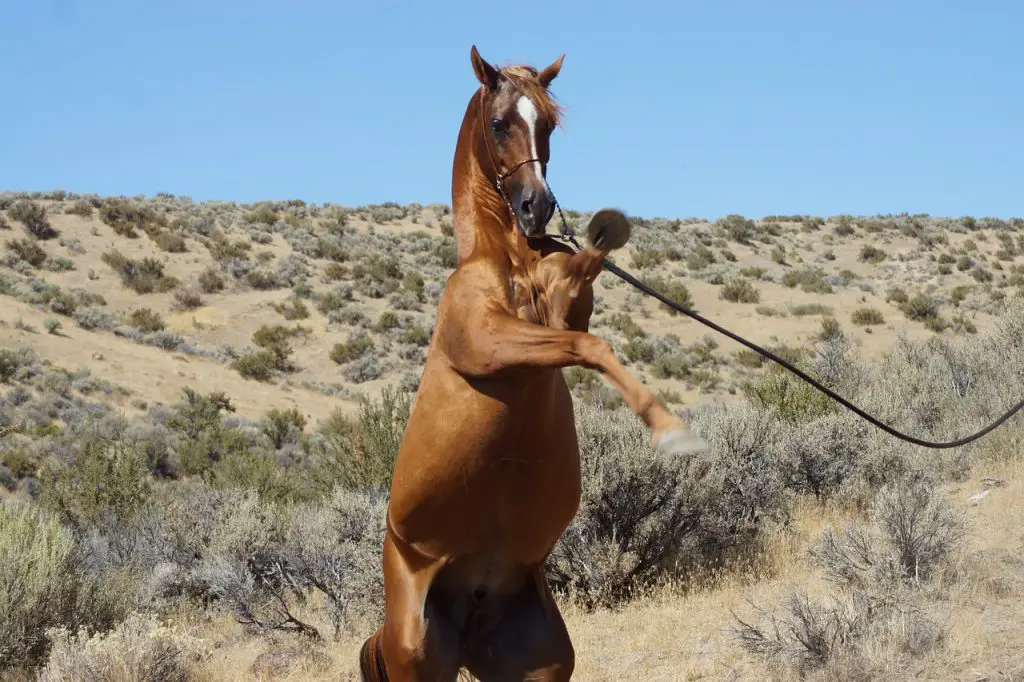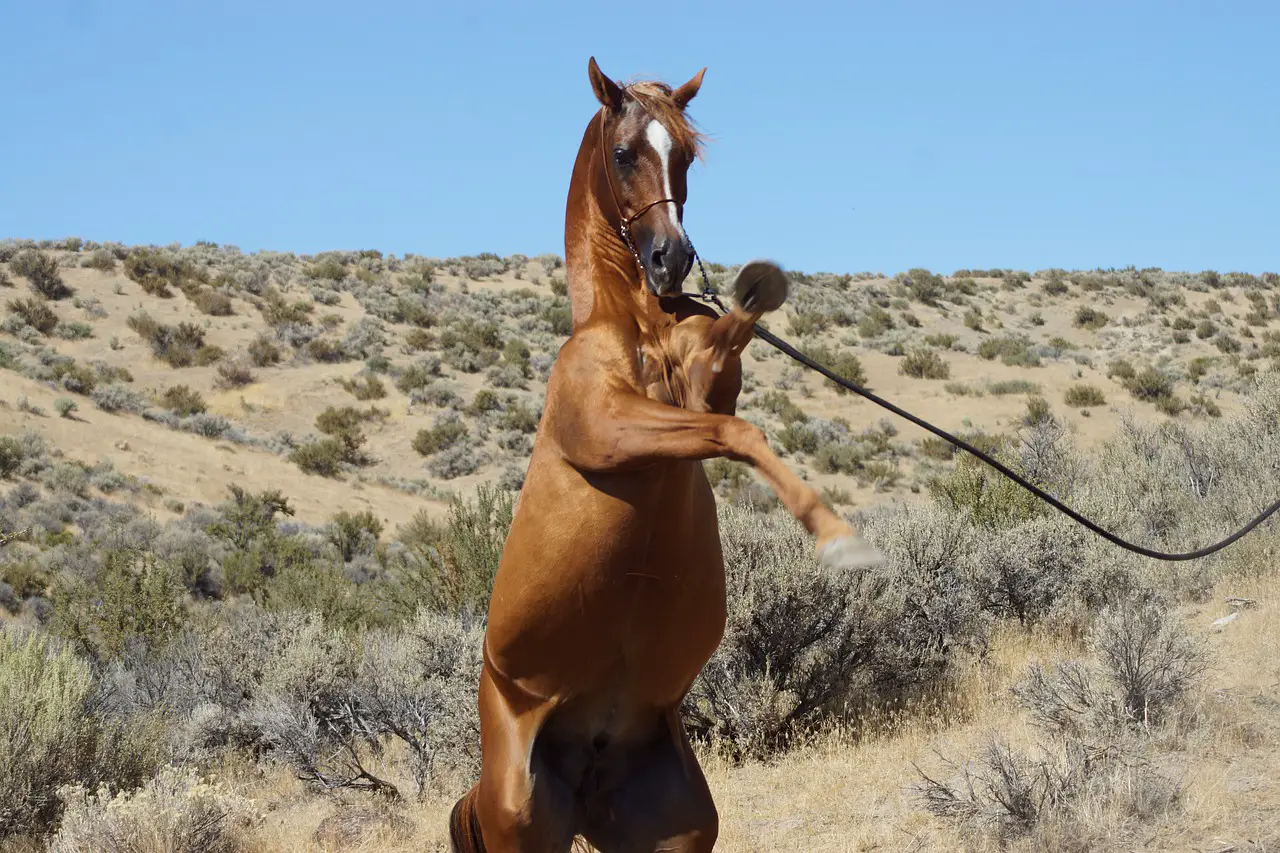Last Updated on February 23, 2022 by Allison Price
You can help your horse overcome nervousness by being a source of comfort, security and safety. Here are some tips.
Few people have ever encountered an anxious horse. It could be obvious or subtle, depending on how he is feeling. Horses can wheel and spin, or run to comfort places such as the barn, stall, or group of friends. Others may grind their teeth, but otherwise perform well.
A horse can be anxious for many reasons. Anxiety can often be caused by confusion. The horse may not know where he is, what he needs to do and why he is there. He may have difficulty complying with a request that he finds difficult.
For example, in eventing we work with many Thoroughbreds that are not on the track. Although racehorses are expected to give 110 percent, in eventing, like in other disciplines, we don’t want horses to exert that much energy too often. It’s common for an ex-racehorse to feel anxious about his new job as he makes the transition from racing to eventing. He’ll be asked to do something completely different to what he has done all his life. Although a rider may think asking this horse to slow down isn’t a big deal for him, it’s quite significant.
There are ways to reduce anxiety in horses, regardless of the cause. These are some techniques that can help reduce horse anxiety.
Start small, especially at the beginning
It is important to not ask too much of a nervous horse when working with him.
Recognize his limitations. His level of training and physical condition may limit his ability to perform the tasks you ask, even though he might be willing to try. You need to be aware and realistic about his abilities so he doesn’t have to use your aid.
Recognize his mental limitations. The ability of a horse to complete a task is dependent on his past experience, age and training. Never force your horse to solve a problem he isn’t capable of solving.
Establish boundaries
Because you like your horse, he won’t calmly do what you ask. Horses don’t have the brain to be loyal like that. If you set ground rules and communicate clearly and consistently what you expect from him, he will comply with your requests.
As a young rider, I learned a wonderful expression: “The horse must be in a box and have total freedom within that box.” This refers to the fact that there are rules and a clear purpose that the horse must follow within that space. He must be able to think and express himself in the box. However, he must operate within the boundaries you have set for him. You can’t allow the horse to do certain things within that box. You, as leader, must communicate the rules.

You can do this with simple exercises. This drill is often used to calm anxious jumpers who are afraid of running from a fence. To mark the route the horse must take to get to the jump, I place cones or rails in a wide area of the ground. I also establish the rule that the horse cannot run away from the fence. I marked the area that the horse can use with the cones and placed it in a box.
If he is unsure, the horse can stop and look at it. He is not permitted to run by it, or to try to get around it. He can take down the fence, but he must follow the rules and pass between the cones. He can express himself and make mistakes, but he must adhere to the route I have outlined.
Make sure to use precise tools
Our horses communicate the same way with us. We communicate with our horses using body language, the crop, the bit, and the leg.
Horsepersons must be consistent in applying these aids. This is especially true when working with anxious horses.
People tend to focus only on the application of aids and not the release. Release of aids at the right moment is the best tool you have. The old saying, “Aim a little and get a lot” applies to aids release.
You ask the horse to do something if you apply pressure. You release pressure when he responds. Then, you reward him by softening your aid. You want to be able to notice when the horse responds to your pressure and reward him immediately with release. This means that you immediately reward any attempt to make it work.
His comfort is yours
You must be a stable presence in the horse’s life to help him make progress. You can’t sympathize with him. He won’t be helped by your feelings of sorry, regardless of the reason he became anxious. He will soon learn that you can push him around. This can make you anxious, and the horse’s anxiety will only make it worse.
Instead, comfort him with your consistent efforts and the pressure-release technique. This will help him relax. This reward is found in the release of pressure or softening it. Once he starts to relax into his job, it is a great moment to praise.
It’s all about one-on-one communication for anxious horses. A horse who is unsure of himself and has a partner with only one person will have more success. An anxious horse won’t be able to perform at his best when he has to work with someone new every time he enters the ring. It could be something he wants to achieve in the future, but first overcome his anxiety and commit to a partnership between you.
You and your horse will be happier if you focus on building your partnership one step at a time. Expecting big changes or the horse to stop worrying suddenly is unrealistic. You’ll almost always get results if you have patience.
Horse anxiety can be very difficult to manage. Nervousness can be caused by a bad experience. This type of fear is difficult to overcome. These cases will require professional training to help you overcome your fear.
The vast majority of anxious horses can be helped by consistent and sensible handling. Like any other aspect of riding, easing your horse’s anxiety is a continuous process. Everybody is constantly trying to communicate better with horses, to make their aids more clear and to time them better.
When the horse responds to your aids with ease, ease and relaxation, you will know that you are getting somewhere. Your horse’s ease is a sign that he doesn’t just understand what you are asking.



